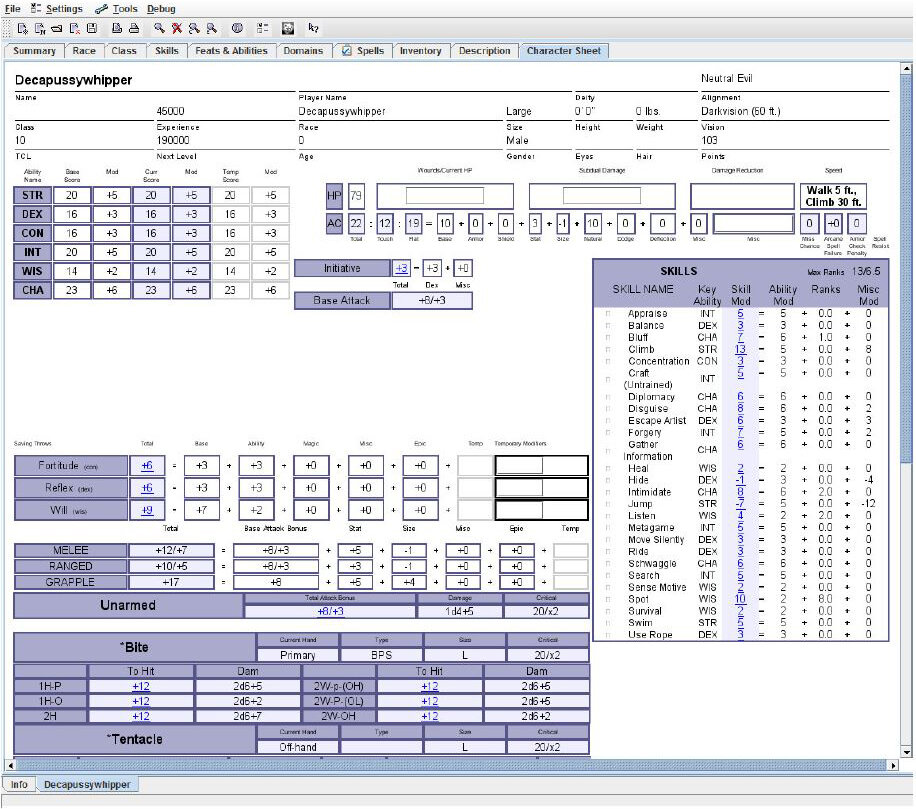Digital Dice: Character Generators

A lot of downtime is spent first creating and then maintaining characters, be they player characters or NPCs. During those dreaded times when players need to create brand-new characters, the entire process can even take up a whole play session’s worth of time. Technology comes to the rescue in these situations in the form of character generators.
Character generators generally take two distinct forms. On the one hand, there are random character generators and, on the other, more feature-rich character management systems. The first variety of character generator is generally more useful to game masters but they can serve to prompt players with ideas for their own characters. The second sort is extremely useful when dealing with forgetful players and when maintaining characters over long campaigns. Random character generators really tend to shine in those awkward situations when players want to know more about — or engage in combat with — an NPC that was only intended to have a fleeting role in the adventure.
There are many “Random NPC Generators” available online, most of which function by generating a random statistics block for a character of a specified race, level, class, etc. Some are more robust than others, and will handle loot, equipment, and prepared spells — and these are the generators to look out for, as it is easier to remove information in a pinch than to add it.
Of equal value, however, and often overlooked, are random personality and background generators. In many social encounters, a NPC’s statistics have far less bearing on their motivations in a conversation than their personalities would. Some of these generators are “trait” generators that generate descriptors — such as nervous ticks or speech impediments — and these tend to be of limited use. Look instead for personality generators that place a character’s motivation on a scale (e.g., between greed and altruism). Personality generators like these are far more useful in determining how an NPC may react to players, and makes GM decisions for that NPC far less arbitrary.
An excellent resource of this variety can be found at www.roleplayingtips.com/tools/npc_personality.php. Having a background story for an NPC gives the option for potential adventure hooks in the event that such a character becomes more important to an adventure than originally planned. Keep an eye out for generators that give more general descriptors of a character’s background, as opposed to those which provide a paragraph. The paragraph-style generators only substitute a few words into a limited number of templates, and therefore provide limited variance. Players will only have patience for so many orphan NPCs of noble birth who have sworn vengeance on their murderers.
Also of use to players and GM’s are character management applications, which handle all of the bookwork for GMs and players. Ideally, generators of this variety will be backed by a database that contains a specific game’s rule system.
PCGen is an excellent application of this kind. It has support for many game systems, including PathFinder and D&D 3.5e, and even has support for Skirmisher Publishing’s 3.5 supplement Nuisances. PCGen assists in the character-creation process by making sure requirements are met when picking feats, automatically fills in the correct number of skill points a character receives, has readily available descriptions for everything, and even manages spell selection. After characters have been created, a GM can plug experience points into a party of characters and it will handle leveling up as well. Finally, when characters are ready for use, PCGen automatically generates character sheets for print. All in all, a system like PCGen cuts down on a lot of the tedium of character maintenance.
There are generators for most games out there, so search the Web and you may very well find one that does what you are looking for. And, if you do, chances are that it will save you some time.
Below is a screenshot of a character sheet produced by the PCGen character generator. This application supports many game systems (e.g., Pathfinder) and supplements them, including the popular Skirmisher Publishing LLC book Nuisances.